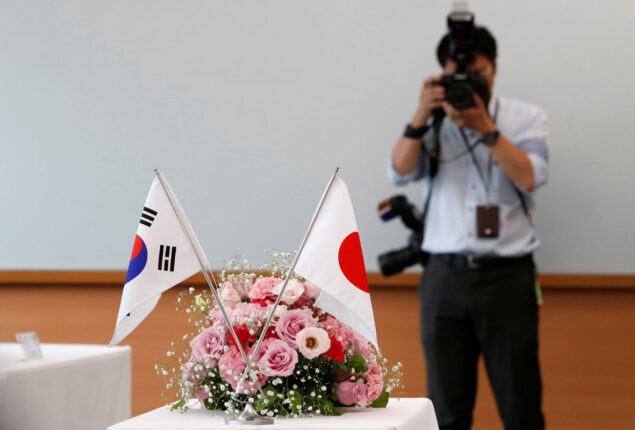South Korea, U.S. discussing nuclear exercises as tensions builds with North -Yoon
Yoon Suk-yeol says Seoul and Washington are contemplating prospective nuclear exercises. Comments...

US allies South Korea and Japan makes deal to ease strains
South Korea on Monday announced a deal to recompense those who were subjected to forced labour by Japan during its rule of Korea.
While the two United States allies work to improve relations in the face of an increasingly tense security environment in the Indo-Pacific.
As “a bold new chapter of cooperation and engagement between two of the United States’ closest allies,” US President Joe Biden praised the decision.
The government’s Foundation for Victims of Forced Mobilization by Imperial Japan would recompense 15 victims or their family members using donations from the public, according to South Korea’s Foreign Minister Park Jin on Monday.
The South Korean Supreme Court determined in 2018 that Nippon Steel and Mitsubishi Heavy Industries of Japan must pay each of the 15 South Korean victims who were mobilized under Japan’s occupation between 1910 and 1945 100 million Korean won ($77,000) in compensation.
Only three of the 15 victims who took part in the lawsuit are still alive today, and they are all 90 or older.
“We welcome the measures announced by the South Korean government today as a way to restore a healthy relationship between Japan and South Korea, which has been in a very difficult situation since South Korea’s Supreme Court ruling in 2018,” Japanese Foreign Minister Yoshimasa Hayashi told reporters.
“The measures announced by the South Korean government are not on the premise that Japanese companies will contribute to the foundation (in South Korea). The Japanese government doesn’t have any particular stance on voluntary donations by individuals or private companies both in Japan and abroad,” he said.
The South Korean court’s 2018 ruling was rejected by Japan, and Tokyo made no restitution.
As a result, there were more tensions between the two countries, which led to Japan restricting the export of materials used to make memory chips and South Korea ending its military intelligence-sharing agreement with Tokyo while Moon Jae-in, the president of South Korea before Yoon Suk Yeol, was in office.
The Japanese occupation of Korea, during which many Koreans were brutalizer and made to work, still has a strong emotional impact on relations between Japan and South Korea.
In 1965, South Korea and Japan agreed to a treaty that normalized their relations and was meant to resolve the majority of their historical differences.
However, South Korea at the time was a military dictatorship, and many Koreans believed the agreement to be unfair; they are still fighting against it now.
The ownership of a collection of islands known as Dokdo in Korean and Takeshima in Japanese has also been the subject of a contentious dispute between the two sides for more than 50 years.
However, the Yoon administration has been working to strengthen ties between Seoul and Tokyo, particularly as the two US allies face a more dangerous security environment due to North Korean missile tests that endanger both South Korea and Japan as well as tensions across the Taiwan Strait, a region that both Tokyo and Seoul claim is crucial to their respective security.
According to Monday’s remarks from Foreign Minister Park, South Korea has been working under Yoon to find a “fair solution” that is in the interests of both nations while respecting the views of the people who were subjected to forced labor.
“I think we need to break the vicious cycle for the people in terms of national interest without neglecting such a prolonged strained relationship between South Korea and Japan,” Park said as he emphasized the importance of bilateral relationship.
The highest levels of government in Washington expressed their instant approval of Monday’s declaration, with Vice President Biden noting that both parties were “taking a key step to construct a future for the Korean and Japanese people that is safer, more secure, and more affluent.”
Yoon and Kishida may have a difficult time persuading voters to approve the agreement, according to Leif-Eric Easley, a professor at Seoul’s Ewha University.
Catch all the World News, Breaking News Event and Latest News Updates on The BOL News
Download The BOL News App to get the Daily News Update & Follow us on Google News.